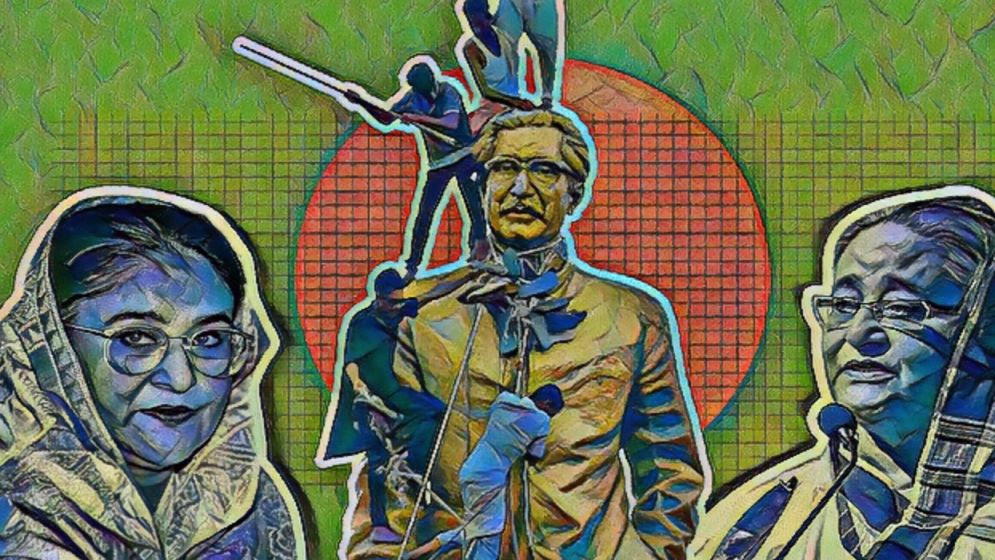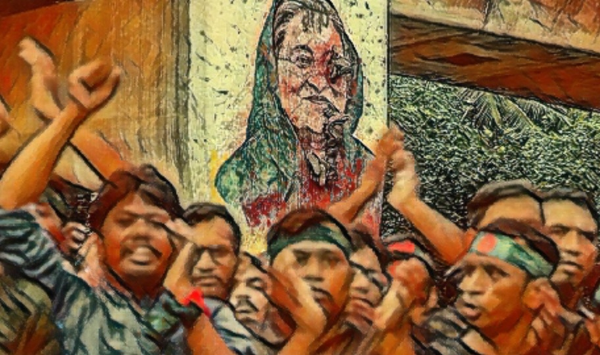Revisiting July 2024: How Hasina’s dictatorial turn ignited the revolutionary scaled monsoon uprising?

On December 29, 2008, Sheikh Hasina secured a ‘landslide victory’ in a parliamentary election that many deemed as free and fair.
Taking the oath as Prime Minister on January 6, 2009, she stepped into office with one clear mandate: to bring the perpetrators of 1971 war crimes to justice, eradicate terrorism, and stabilize commodity prices for a struggling populace.
For a time, her government delivered. Terrorism was indeed uprooted, and economic development flourished, particularly until 2018. Yet, this period of progress was tragically shadowed by the emergence of a sinister new terror, one inflicted by the state itself.
Under her regime, extra-judicial killings and enforced disappearances, often executed by state law enforcement agencies, particularly the notorious Rapid Action Battalion (RAB), became a chilling reality for the opposition and dissenting voices.
This calculated internal terror, wielded against her own citizens, starkly reveals a leader's ruthless determination to cement an unyielding grip on power, betraying the very democratic ideals that once swept her into office.
The façade of legitimacy that once cloaked Sheikh Hasina's ascent began to crumble with the deeply controversial 15th Amendment to Bangladesh's constitution.
This audacious move, widely condemned as a ‘judicial coup’, abolished the non-partisan caretaker government – a vital safeguard for free and fair elections – and effectively reinstated the 1972 constitution.
Passed without the opposition's presence and, more critically, without a referendum, this amendment was a strategic masterstroke designed to cement political control and orchestrate a decade of electoral charades.
As The Daily Star presciently noted in July 2011, it even sought to render immutable certain core constitutional provisions, an audacious power grab that would ultimately stifle dissent and escalate the chilling trend of enforced disappearances.
The final, brutal blow to judicial independence came in 2017 with the unceremonious removal of Chief Justice Surendra K. Sinha, who later lamented that Hasina had debased the Supreme Court to the level of a mere magistrate’s bench.
-686e14e7a54ad.jpeg)
Complete descent into
authoritarianism
The descent into authoritarianism accelerated in 2018 with the politically motivated imprisonment of Begum Khaleda Zia, the formidable former Prime Minister who is known as “an uncompromising leader.”
Widely dismissed as dubious, the corruption charges against Zia were a transparent ploy to neutralize a chief political rival and eliminate her from the impending elections.
What followed was the infamous "Overnight Election," a global byword for electoral fraud. As the BBC's Chittagong correspondent first reported, and subsequent accounts corroborated, ballot boxes were stuffed under the cloak of darkness, effectively rendering the public vote a meaningless formality.
The international community and local observers recoiled in horror at this blatant assault on democracy, a naked power grab that delivered Hasina a near-absolute 95% of the vote – an outcome depressingly reminiscent of autocracies like Russia and Syria.
The edifice of Sheikh Hasina's increasingly autocratic rule began to visibly crack in December 2021, when the U.S. Treasury Department courageously imposed sanctions on six law enforcement officers and the notorious RAB.
The immediate aftermath was palpable: a dramatic decline in extrajudicial killings, a collective sigh of relief from a terrorized populace, gratitude from the beleaguered opposition, and even whispers of celebration among prisoners held in RAB custody.
This decisive action by the United States, in a single stroke, rekindled the dormant embers of democratic hope in Bangladesh, setting the stage for a revolutionary uprising eerily reminiscent of Bastille Day.
Yet, after more than a decade entrenched in power, Hasina's self-confidence had metastasized into outright arrogance. She began to treat the general populace as mere serfs, reserving her favor for party loyalists.
This disdain fueled simmering resentment among the struggling middle and lower-middle classes, choked by soaring commodity prices.
Her flippant suggestion to "Eat jackfruit as a substitute for meat" in response to the cost-of-living crisis, a ghastly echo of Marie Antoinette’s "Let them eat cake," only further exposed her detachment and callous disregard for her citizens' plight.
The charade culminated in the "Dummy election" of January 7th, a widely derided spectacle where all candidates hailed from the ruling party alliance. Unsurprisingly, it failed to garner recognition from either domestic or international observers.
The primary opposition, the BNP, wisely boycotted the farce, citing pervasive fraud and the political imprisonment of their senior leadership.
The grim truth is that since 2008, the people of Bangladesh have been systematically denied the right to vote freely and without fear.

The beginning of the downfall
In the chaotic wake of this illegitimate election, Sheikh Hasina found herself utterly incapable of stemming the tide of economic despair.
Commodity prices surged, inflation spiraled, and unemployment soared, igniting a furious student movement demanding the abolition of quotas in public sector jobs.
Hasina’s response was characteristically brutal: she branded these peaceful protesters "Razakars"—traitors of the 1971 Liberation War—and unleashed her cabinet ministers, the ruling party’s student wing, and the police to crush the demonstrations.
This heavy-handed repression only ignited a broader inferno across Dhaka's elite universities and other major cities. On July 18th, the state's true barbarity was laid bare: police were deployed with shoot-on-sight orders, leading to the tragic slaughter of over 100 students.
This horrific crackdown incited nationwide outrage, forcing the government to impose a sweeping curfew and an internet shutdown. The following day, as people of all ages and professions defied the curfew, police opened fire on unarmed civilians, provoking enraged protesters to set fire to police stations across metropolitan areas.
The situation spiraled further into a dystopian nightmare as the government resorted to aerial attacks on its own citizens, resulting in the deaths of innocent children, including a four-year-old girl fatally shot through a window.
The scale of brutality orchestrated by Hasina’s elite forces drew grim, undeniable comparisons to the heinous atrocities committed by the Nazi regime in World War II.
The lifting of the curfew brought no respite, only a new wave of state-sponsored terror. Police, unleashed with impunity, swept through residential areas, conducting warrantless raids and dragging thousands of students into detention.
The students, now emboldened, escalated their demands, calling for the prosecution of the police and ruling party thugs responsible for the barbaric crackdown. Yet, Sheikh Hasina remained as unyielding as ever, deaf to the cries for justice.
Then came the definitive blow, a chilling testament to the utter subjugation of the judiciary. On July 28th, a group of courageous lawyers filed a writ petition with the High Court, desperately seeking to restrain law enforcement from firing on protesters.
The High Court’s response, on August 4th, was a chilling dismissal – a decision that effectively hammered the final nail into the coffin of Sheikh Hasina’s tyrannical regime.
The ensuing wave of outrage was global. Bangladeshi expatriates and students abroad, a vital artery of the nation's economy, threatened to choke off foreign currency remittances, signaling their unwavering solidarity with the revolution.
Despite this mounting pressure from both within and beyond Bangladesh's borders, Hasina, blinded by hubris, remained hell-bent on escalating her brutal crackdown, determined to extinguish the flames of dissent.
What she failed to grasp, however, was that the ghosts of the French Revolution were stirring in Bangladesh. Enraged protesters, no longer cowering, began their inexorable march towards her opulent residence in downtown Dhaka.
As the consequences of her reign of terror converged upon her, the Chief of Army Staff, General Waqar Uz Zaman, delivered the decisive blow.
At midday, a terse announcement shattered the nation: Sheikh Hasina, Bangladesh's longest-serving Prime Minister, had resigned.
The curtain had fallen on an era of unparalleled oppression, swept away by the righteous fury of a people who had finally reclaimed their voice.
—
Asm Toufiq Imam completed his masters from Montfort University in Leicester. He is currently working as an executive in one of the oldest home appliance companies in Bangladesh. He can be reached at–[email protected]

